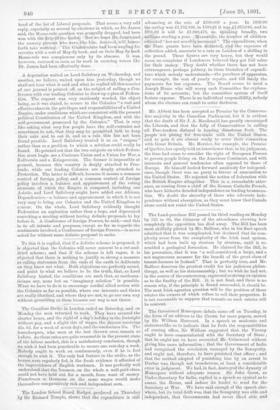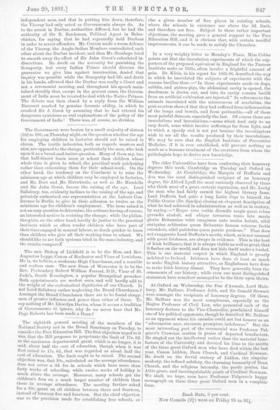The threatened Muneepore debate came off on Tuesday, in the
form of an address to the Crown for more papers, moved by Sir William Harcourt. In a speech so moderate and statesmanlike as to indicate that he feels the responsibilities. of coming office, Sir William suggested that the Viceroy ought to have communicated with the Secretary of State that he ought not to have overruled Mr. Grimwood without giving him more information ; that the Government of India had recognised the revolution managed by the Senaputty„ and ought not, therefore, to have punished that officer ; and that the method adopted of punishing him by an arrest in Durbar was, though not treacherous, at least a considerable error in judgment. We had, in fact, destroyed the dynasty of Muneepore without adequate reason. Sir John Goret, as, Under-Secretary for India, replied in a speech so cynical as to
the House, and induce its leader to send for the Secretary at War. We have said enough of the speech else- where, but its total drift was, that the Senaputty was able and independent, that Governments had never liked able and. independent men, and that in putting him down, therefore, the Viceroy had only acted as Governments always do. As to the arrest in Durbar, authorities differed, but he had the authority of Sir R. Sandeman, Political Agent in Beloo- chistan, for saying that he had repeatedly held Durban in order to arrest offenders. Mr. Curzon made a warm defence of the Viceroy, the Anglo-Indian Members contradicted each other about the Durbar incident, and then Mr. Stanhope tried to smooth away the effect of Sir John Gorst's calculated in- discretions. He dwelt on the necessity for punishing the Benaputty, lest every Indian Prince should distrust the guarantee we give him against insurrection, denied that inquiry was possible while the Senaputty had life and death in his hands, affirmed that the Durbar was really a Court and amt a ceremonial meeting, and throughout his speech main- tained steadily that, except in the gravest cases, the Govern- ment of India must be trusted to deal with the Native Princes. The debate was then closed by a reply from Sir William Harcourt marked by genuine forensic ability, in which he crushed Sir J. Gorst by assuming that he had uttered his dangerous cynicisms as reel explanations of the policy of the Government of India! There was, of course, no division.



































 Previous page
Previous page